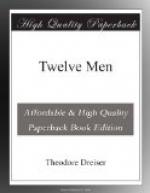But after meeting with and working for M—— under this new arrangement and being apparently fascinated for the moment by his personality, he seemed to me to gradually lose sight of his ideal, to be actually taken in by the plausible arguments which the latter could spin with the ease that a spider spins gossamer. In that respect I insist that M—— was a bad influence. Under his tutelage L—— gradually became, for instance, an habitue of a well-known and pseudo-bohemian chop-house, a most mawkish and naively imitative affair, intended frankly to be a copy or even the original, forsooth, of an old English inn, done, in so far as its woodwork was concerned, in smoked or dark-stained oak to represent an old English interior, its walls covered with long-stemmed pipes and pictures of English hunting and drinking scenes, its black-stained but unvarnished tables littered with riding, driving and country-life society papers, to give it that air of sans ceremonie with an upper world of which its habitues probably possessed no least inkling but most eagerly craved. Here, along with a goodly group of his latter-day friends, far different from those by whom he had first been surrounded—a pretentious society poet of no great merit but considerable self-emphasis, a Wall Street broker, posing as a club man, raconteur, “first-nighter” and what not, and several young and ambitious playwrights, all seeking the heaven of a Broadway success—he began to pose as one of the intimates of the great city, its bosom child as it were, the cynosure and favorite of its most glittering precincts--a most M-----like proceeding. His clothes by now, for I saw him on occasion, had taken on a more lustrous if less convincing aspect than those he had worn when I first knew him. The small round hat or rakish cap, typical of his Western dreams, had now given way to a most pretentious square-topped derby, beloved, I believe, of undertakers and a certain severe type of banker as well as some clergymen, only it was a light brown. His suit and waistcoat were of a bright English tweed, reddish-brown or herring-bone gray by turns, his shoes box-toed perfections of the button type. He carried a heavy cane, often a bright leather manuscript case, and seemed intensely absorbed in the great and dramatic business of living and writing. “One must,” so I read him at this time, “take the pleasures as well as the labors of this world with the utmost severity.” Here, with a grand manner, he patronized the manager and the waiters, sent word to his friend the cook, who probably did not know him at all, that his chop or steak was to be done just so. These friends of his, or at least one of them (the poet) he met every day at five for an all-essential game of chess, after which an evening paper was read and the chop ordered. Ale—not beer—in a pewter mug was comme il faut, the only thing for a gentleman of letters, worthy of the name, to drink.




